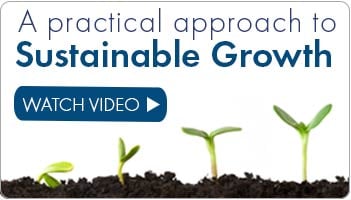At Client Focus, we’ve seen that when rates go up, many agents begin to worry. They expect to lose policies, and even clients, based solely on rate fluctuations. They think of themselves as price takers. Price taking looks like this: if you and I produce equivalent widgets, I have to charge what you're charging or I'll lose business. This applies to everything from cans of soda to low-end automobiles.
This concept should only apply to equivalent goods and services. Unfortunately, though, many companies produce superior goods and services but sell them like they are equivalent. They choose to compete on price because they aren’t confident about selling the superiority of their offerings.
Many insurance agents fall into this trap.
On the one hand, the fear of price competition is natural. In fact, a price threshold exists above which keeping clients would be impossible. For example, a client who pays a competitive $100 monthly premium will not tolerate a price hike to $200. But what about $101? $105? $110? At what point do clients jump ship?
This is where we need to move the discussion from a price to value.
What is a [your name] policy worth?
If we pulled policies out of vending machines, they would all be worth the exact same price for the exact same coverage. A $100 policy would be worth $100. Not a penny more, not a penny less. Therefore, the difference between the value of two "equivalent" policies is in the value that you add.
If I (Matt Wagner) were an insurance agent, I would have to ask myself how much a Matt Wagner insurance policy is worth. For example, if my clients have a bad experience working with me or my office, the value of a Matt Wagner insurance policy might be worth less than the commodity policy price. I might have to undercut the whole market just to win any business at all.
On the other hand, if my clients find the experience of working with me to be extraordinary, the value of a Matt Wagner insurance policy might be worth significantly more than the commodity policy price. If this is true, it means that I don’t have to worry so much about my prices going up.
As long as the price of a Matt Wagner insurance policy doesn’t exceed the value of a Matt Wagner insurance policy, I’m ok.
I can't control my price, but I can absolutely control my value.
Think about it this way. For many things in life, you will shop for the best price. There are a few things, however, that you will only buy from one person or one company. For me, it’s my real estate agent, Royce Monroe. For you, it might be your doctor, your personal trainer, or your hair stylist. You won’t let them double their price, but there is something about the value of their service for which you are willing to pay a premium.
Establishing Value
So how do you assess the premium value of one of your policies? How can you differentiate your policy from a policy out of a vending machine (or a website)? Here are a few things that top agents leverage to raise the value of a policy:
- A relationship of trust. Showing the client that you care about them and that you are credible.
- Great service. Making it simple and convenient to do business, and quickly resolving concerns.
- Company record. Overcoming fears about claims handling and resolution.
- Brand awareness. Keeping your good name in front of your clients.
- Engagement. Meeting your clients periodically to educate, empower, and protect them.
- Endorsements. Winning social media endorsements and referrals that actually reinforce their commitment to you (more on that here).
- Multi-lining. Providing the convenience and simplicity of having everything in one place.
Selling Value
Once you’ve established the value of your policy, it’s time to sell on value. So many small business owners and salespeople are afraid to do this. If you fall back on price, or avoid the conversation altogether, you demonstrate a lack of belief in your own value. If you don’t believe it, why should the client?
Try a conversation like this:
“You know, Steve, you can save a couple of bucks by going with that company, but you need to understand the trade-off. You see, I’m in this business because I feel a moral obligation to protect you before and after you have a claim. Before your claim, I’m here to make sure that you’re properly covered. After your claim, I’m here to reduce the stress and make life easier. I’m beside you the whole time acting as a trusted advisor. You won’t get that from a website. If someday, heaven forbid, you have a serious claim, I guarantee that you’ll be glad you didn’t make that trade-off. I know it sounds tempting, but let me tell you about someone who is glad that they didn’t make that trade off…”
A conversation like this will resonate much more deeply if you have been engaged with them periodically.
Here are some great tips for driving amazing engagement.
Even more, if they have put their reputation on the line for you in the form of referrals and endorsements, the conversation might not even be necessary. Why? Think of my real estate agent, Royce. Royce has done a half-dozen transactions for me. I’ve referred him a handful of customers who have bought houses from him. I’ve called him “my guy” each time. I’ve convinced myself that he’s worth sticking with. Plus, now that people close to me have gone to Royce at my recommendation, I lose face if I drop him for a no-name agent offering a discount.
Summary
A book of business that is over-exposed to price discussions is vulnerable. Clients today have unlimited pricing information at their fingertips. If they experience and recognize the value that they receive from you, they will stick with you. If you didn't believe in your value, you wouldn't be in business.
by Matt Wagner, Vice President of Strategy
Related Articles:
Supercharge Your Review Appointment Program
5 Steps to Massively Increase Retention
How to Harvest Referrals and Social Media Endorsements





